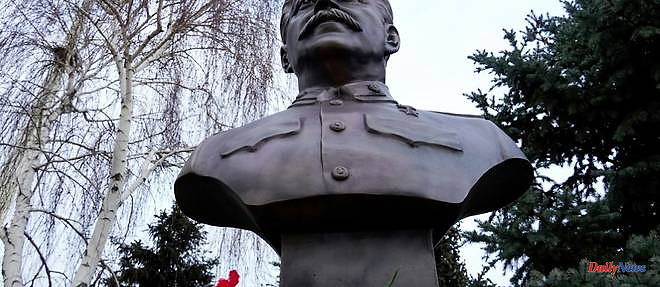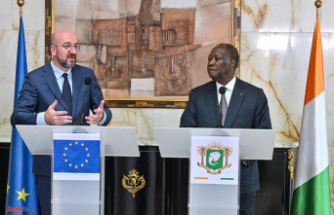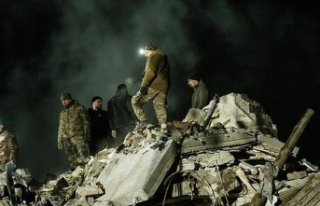"German tanks threaten us again": Vladimir Putin on Thursday drew a parallel between his military campaign in Ukraine and the war against Nazism, on the occasion of the 80th anniversary of the Soviet victory against Hitler's armies in Stalingrad.
For years, the Russian president has presented himself as a staunch defender of the memory of the triumph of the USSR over Nazi Germany, a source of immense pride in Russia and which has practically become a state cult.
And since the beginning of the offensive he launched in Ukraine on February 24, Vladimir Putin has mobilized this imagination extensively by ensuring that the political leaders in power in kyiv are "neo-Nazis" at the origin of a "genocide "of the Russian-speaking populations of this neighboring country.
Thursday, in front of soldiers covered with medals and officials gathered in Volgograd (south-west), the former Stalingrad, he drove the point home again.
"It's unbelievable, but German Leopard tanks, with crosses drawn on them, are threatening us again," he said, comparing Hitler's panzers and the recently promised German-made Leopard 2 tanks. by Westerners to Ukrainians.
"And, again, Hitler's successors want to fight with Russia on Ukrainian soil using banderovtsy," he added, in a reference to supporters of Ukrainian ultranationalist Stepan Bandera (1909 -1959) who had collaborated with the Nazis during the Second World War and whom the Kremlin regularly agitates as a scarecrow to discredit the Ukrainian authorities.
According to his detractors, Vladimir Putin knowingly uses history to defend his policy, even if it means glorifying the power of the USSR and minimizing its crimes.
Considered one of the bloodiest in history, with around two million deaths in total, the Battle of Stalingrad (1942-1943) changed the course of the conflict.
The Soviet victory in this city takes on added symbolic significance as the first anniversary of the February 24, 2022, launch of the military operation in Ukraine approaches, at a time when the Russians are stepping up their attacks in the east of that country after a series of setbacks in the fall.
On the eve of the 80th anniversary of the victory at Stalingrad, a bust of Stalin was unveiled in Volgograd, a city of one million people on the banks of the Volga.
The Russian authorities have had an ambivalent position towards Stalin since the fall of the USSR: officially denounced for the State Terror he orchestrated in the 1930s and until his death in 1953 he was still buried in front of the Kremlin, on Red Square.
He remains respected by many Russians, who highlight his role in the defeat of Nazi Germany against the Soviet Union.
On Thursday, a military parade was held in Volgograd. Wreaths of flowers were also laid in large numbers on Mamayev Kurgan, a strategic hill which was the subject of terrible fighting and has remained for decades a place of pilgrimage for those wishing to pay homage to the exploits of the Red Army.
The Battle of Stalingrad, which began in July 1942, lasted 200 days and nights. This city, transformed into a field of ruins, was the scene of devastating German aerial bombardments and street battles of extreme violence.
On February 2, 1943, the troops of German Marshal Friedrich Paulus, surrounded, capitulated, the first surrender of a Nazi army since the beginning of the war.
Completely rebuilt by order of the Soviet authorities, Stalingrad was renamed Volgograd in 1961, eight years after the death of Joseph Stalin.
Since 2013, by virtue of a decision of local elected officials, it has been "renamed" and becomes Stalingrad again six times a year, in particular on February 2 for the anniversary of the victory in this place and on May 9, the date on which Russia commemorates the defeat of Nazi Germany.
02/02/2023 19:14:46 - Moscow (AFP) - © 2023 AFP












